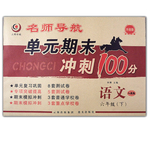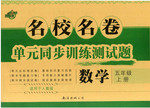题目内容
Bill was staying on a farm with his uncle last summer. So ___ Mary.
- A.did
- B.has
- C.was
- D.is
So was Mary,这是倒装句. So代替前面的 Bill was staying on a farm with his uncle last summer.

 名师导航单元期末冲刺100分系列答案
名师导航单元期末冲刺100分系列答案 名校名卷单元同步训练测试题系列答案
名校名卷单元同步训练测试题系列答案There were two interesting pieces of news items in the paper a few years ago. One was about a man who received a bill from the telephone company for $ 2,000 a month for doing nothing.
The connection between the two news items is simple; computers-the best invention of the 20th century. The telephone bill came from a computer which made a terrifying mistake; that man’s bill was only $ 23.26. The other item was not as amusing. A man walked into the unguarded computer room of a large packaged food company and expertly programmed the computer to pay him $ 2,000 a month for raw meat which he “supplied ” to the company. Of course he never sent the meat, but he certainly received the money . The computer wrote out a bill, and even “signed ” it. It was only a random (随便) check that uncovered the trick. It could be happening in thousands of other companies all over the world.
Computers are not the magical workers that some people say they are. They make mistakes, they’re sometimes slower than human beings and they’re easily fooled.
The US used to conscript (征兵) people with the help of a computer. The army sent out a card, which had to be filled in and sent back. It was easy to avoid being called up simply by spreading candle-wax(腊) on the card. The computer couldn’t read the card, and did nothing with it.
It’s in our everyday life that computers cause many problems. Let’s get back to using people instead of computers, before a mistake that we can’t put right.
【小题1】In the first paragraph we can conclude ______.
| A.the paper is telling a lie | B.the first sentence is the topic sentence |
| C.the two news items made people surprised | |
| D.if a man did nothing at all for the telephone company, he would still get $2,000 a month |
| A.the computers are magical workers |
| B.the computers can do anything as well as man |
| C.the computers can write out the bill and even sign it |
| D.the computers sometimes also make mistakes |
| A.were used to conscript people | B.are usually faster than human beings |
| C.are not so magical as people expect | |
| D.were not easily controlled and always fooled human beings |
| A.we’d better use people instead of computers in our everyday life |
| B.we should not use computers because they always make mistakes |
| C.computers are widely used in our everyday life |
| D.if we want to work well, don’t use the computers |
Jacqueline Bouvier Kennedy Onassis was one of the most private women in the world, yet when she went to work as an editor in the last two decades of her life, she revealed(展现)herself as she did nowhere else.
After the death of her second husband, Greek shipping magnate(巨头)Aristotle Onassis, Jacqueline’s close friend and former White House social secretary Letitia Baldrige made a suggestion that she consider a career(职业)in publishing. After consideration, Jacqueline accepted it. Perhaps she hoped to find there some idea about how to live her own life. She became not less but more interested in reading. For the last 20 years of her life, Jacqueline worked as a publisher’s editor, first at Viking, then at Doubleday, pursuing(追求)a late-life career longer than her two marriages combined. During her time in publishing, she was responsible for managing and editing more than 100 successfully marketed books. Among the first books were In the Russian Style and Inventive Paris Clothes. She also succeeded in persuading TV hosts Bill Moyer’s and Jose Campbell to transform their popular television conversations into a book, The Power of Myth. The book went on to become an international best-seller. She dealt, too, with Michael Jackson as he prepared his autobiography(自传), Moonwalk.
Jacqueline may have been hired for name and for her social relations, but she soon proved her worth. Her choices, suggestions and widespread social relations were of benefit both to the publishing firms and to Jacqueline herself. In the books she selected for publication, she built on a lifetime of spending time by herself as a reader and left a record of the growth of her mind. Her books are the autobiography she never wrote. Her role as First Lady, in the end, was overshadowed by her performance as an editor. However, few knew that she had achieved so much.
【小题1】We can learn from the pa ssage that Jacqueline _________
ssage that Jacqueline _________
| A.because fond of reading after working as an editor |
| B.was in charge of publishing 100 books |
| C.promoted her books through social relations |
| D.gained a lot from her career as an editor |
 n the last paragraph probably means that_________
n the last paragraph probably means that_________| A.Jacqueline ended up as an editor rather as First Lady |
| B.Jacqueline’s life as First Lady was more colorful than as an editor |
| C.Jacqueline was more successful as an editor than as First Lady |
| D.Jacqueline’s role as First Lady was more brilliant than as an editor |
| A.Jacqueline’s two marriages lasted more than 20 years |
| B.Jacqueline’s own publishing firm was set up eventually |
| C.Jacqueline’s views and beliefs were reflected in the books she edited |
| D.Jacqueline’s achievements were widely known. |
| A.an introduction of Jacqueline’s life both as First Lady and as an editor |
| B.a brief description of Jacqueline’s lifelong experiences |
| C.a brief account of Jacqueline’s career as an editor in her last 20 years |
| D.an analysis of Jacqueline’s social relations in publishing |
Mark was walking home from school one day when he saw the boy in front of him fall over and drop all of the books. He was carrying, along with two sweaters, a basketball and a walkman(随身听). Mark stopped and helped the boy pick up these things. Since they were going the same way, he helped to carry some of his things. As they walked, Mark knew that the boy’s name was Bill, that he loved computer games, basketball and history, and that he was having lots of trouble with his other subjects and that he had just broken up with his girlfriend.
They arrived at Bill’s home first and Mark was invited in for a Coke and to watch some television. The afternoon passed happily with a few laughs and some small talk, and then Mark went home. They often saw each other at school, had lunch together once or twice, and then they both finished middle school. They ended up in the same high school where they sometimes saw and talked with each other over the years. At last just three weeks before they finished high school, Bill asked Mark if they could talk.
Bill asked Mark if he still remembered the day years ago when they had first met. “Did you ever think why I was carrying so many things home that day?” asked Bill. “You see, I cleaned out my locker(锁柜) because I didn’t want to leave anything for anyone else. I had put away some of my mother’s sleeping pills and I was going home to kill myself. But after we spent some time together talking and laughing, I began to understand that if I killed myself, I would have missed that time and so many others that might follow. So you see, Mark, when you picked up those books that day, you did a lot more. You saved my life.”
1. When Mark met him the first time, Bill was going _______.
|
A.to have a basketball game |
B.to his classroom |
|
C.to see Mark |
D.back home |
2.From what Bill was carrying, we can know that he _______.
|
A.was a good student |
B.liked sports and music |
|
C.liked all the subjects in school |
D.was a good friend |
3. Mark and Bill _______.
|
A.were in the same middle school and high school |
|
B.were in the same middle school but not in the same high school |
|
C.often had lunch together at school |
|
D.had known each other before they began to study in middle school |
4.In this passage, the phrase “break up” means _______.
|
A.相处很好 |
B.和好如初 |
C.关系破裂 |
D.保持联系 |
5.When Mark helped Bill to pick up some of his things, he _______.
|
A.knew he could save Bill’s life |
|
B.knew who Bill was and wanted to help him |
|
C.didn’t know why he was going to help him |
|
D.didn’t know what he was doing was very important to Bill |